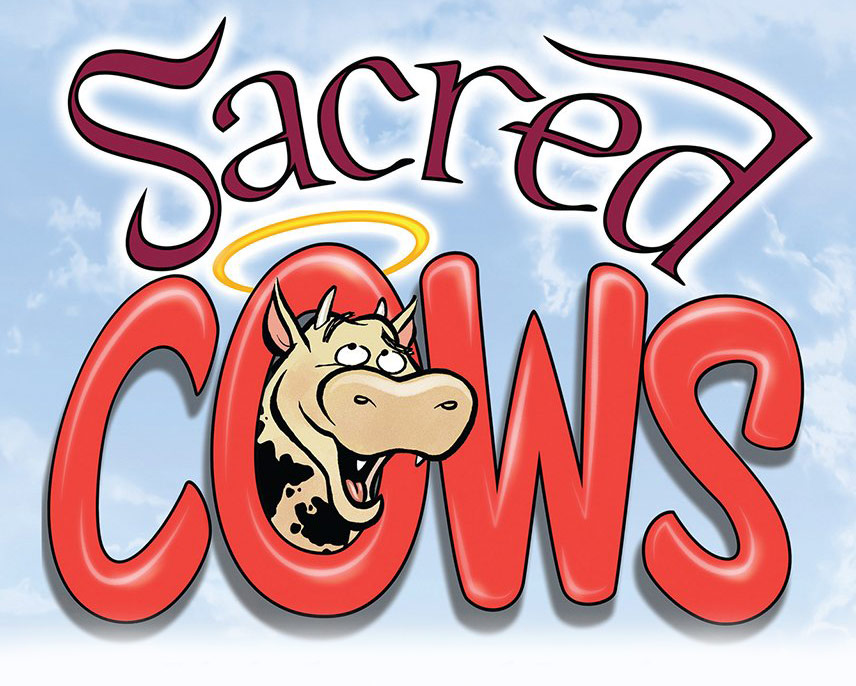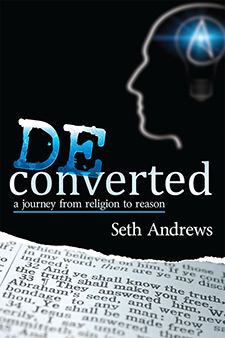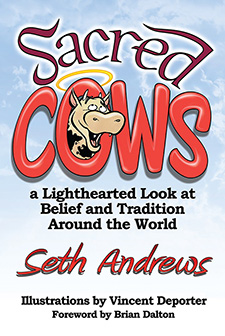Those of us who have read extensively in the field of comparative religion are pretty familiar with many of the bizarre beliefs and practices of religions and cultures all over the world. But most Americans are alarmingly insular and unaware of other cultures and religions, especially if they’ve been raised in a small rural town and taught to think only one way by their church. Even in the relatively liberal Presbyterian church where I was raised, serious discussions of other religions were taboo. It was not until high school church groups that I heard about other “cult” religions such as Jehovah’s Witnesses, Mormons, Christian Scientists, and Scientologists, and that exposure was simply to mock and condemn their belief systems, without any close examination of the absurdities we were expected to believe. Most Americans continue to grow up without thinking very deeply about other religions (other than mocking them on a superficial basis), and never question the assumptions of their own faith.
Seth Andrews came from such a background. Raised in a strict fundamentalist church and sheltered from exposure to any ideas about religion or science that might shake his faith, he went through life without questioning any of it until he was an adult. As he recounts in his previous autobiographical book Deconverted: A Journey from Religion to Reason (which I reviewed), Andrews was making a living as a DJ on a Christian rock station, still deeply in the faith and insulated from doubt, until a series of events (deaths of beloved Christian rock musicians, 9/11, and switching to a secular radio station) opened his eyes and changed his perspective. Now he runs the very successful Thinking Atheist podcast and produces a number of outstanding videos for YouTube. Thus, Andrews comes to the study of comparative religions and cultures as a layman, rather than a scholar, with a background much like the rest of the fundamentalists in this country who are so vocal about pushing creationism in our schools and affecting our political process.
But it doesn’t require a scholarly background to see how bizarre and often dangerous or destructive many religious beliefs can be. Taking a gently incredulous tone, Andrews reviews a long litany of the strange things people believe and do. In most cases, he tries to be sympathetic and understanding. He always tries to keep things in perspective and remind his readers that he once accepted beliefs that seem odd to him now. But in other cases, it’s impossible not to adopt a note of sarcasm and mockery at beliefs that are clearly bonkers. Who among us is willing to defend the snake-handling cults, who routinely get bitten and die from their belief that faith will stop snake bites and their deadly consequences? Similarly, it’s hard to talk about many other belief systems and keep a straight face, from the weird contortions that Orthodox Jews go through to prevent themselves from doing anything on the Sabbath; the cargo cults that are still waiting for Americans who left after World War II to return to their South Pacific islands and bring their bounty of goods; the Hindus and their actual sacred cows; the weird world of Mormons and their magic underwear; Scientologists and their science fiction founder; Satanic cults and phallic religions; and of course, there’s the Catholic Church. Andrews also dissects many other non-religious belief systems, from fortune tellers and psychics to astrologers and tarot card readers, and even telemarketers, all of whom exploit weaknesses in the human psychological makeup to con people and take their money. He describes some of the truly sickening and destructive practices of some religions, from animal sacrifice to the Bulgarian villages that spin dogs on ropes over a river until they fall and drown, and even cults that break coconuts over their heads, and the Philippine villagers who routinely crucify themselves year after year at Easter time.
Andrews reserves special scorn in his discussion of the people who he used to follow, especially the faith healers and ministers who fleece their flocks for millions while their followers suffer. He discusses their cheap tricks like cold reading, or in the case of Peter Popoff (who is still in business despite being exposed by James Randi) hot reading using a tiny earpiece to hear his wife prompt him with the information gathered before the service. Andrews also spends a lot of time examining the apocalyptic preachers who manage to get rich predicting the End of the World again and again; no matter how many times they are wrong, they still get plenty of believers who follow them and fork over their hard-earned money for books and videos.
Throughout the book, Andrews maintains a gently incredulous tone, lampooning the truly ridiculous without being too harsh or sarcastic—except in the extreme cases, which clearly merit it. As someone who once was in an extreme religious sect himself, Andrews knows that anyone can fall for belief systems if they are raised that way by their family and culture, and are never exposed to any other culture or belief system. But clearly he feels that being culturally bound to certain traditions doesn’t excuse such extreme and destructive things such as self-crucifixion or snake handling. It’s one thing to try to understand and think about a cultural belief in its own context, and maybe have sympathy for people who don’t know any better. But like many of us, Andrews doesn’t think we should respect or treat with reverence those belief systems that lead to bad consequences, from selling false notions to actual torture and death.
Even though the book was done by a small independent publisher, it is free of any typos or errors. All throughout it is enlivened by the hilarious cartoons of Vincent Deporter, which add to the humor. In short, if you want a quick, fun read about the weird things people believe, and delivered without too much scholarly pretension or false attempts to maintain respect of other destructive beliefs and cultures, this book is a worthwhile investment. ![]()
About the Author
Donald Prothero taught college geology and paleontology for 37 years, at Caltech, Columbia, Cal Poly Pomona, and Occidental, Knox, Vassar, Glendale, Mt. San Antonio, and Pierce Colleges. He is the author of over 37 books (including 7 leading geology textbooks, and several trade books), and over 300 scientific papers. He is a Fellow of the Linnean Society of London, the Committee For Skeptical Inquiry, the Paleontological Society, and the Geological Society of America, and also received fellowships from the Guggenheim Foundation and National Science Foundation. In 1991, he received the Charles Schuchert Award for outstanding paleontologist under the age of 40. In 2013, he received the James Shea Award of the National Association of Geology Teachers for outstanding writing and editing the geosciences. In 2015, he received the Joseph T. Gregory award for service to vertebrate paleontology. He has been featured on numerous TV documentaries, including Paleoworld, Walking with Prehistoric Beasts, Prehistoric Monsters Revealed, Monsterquest, Prehistoric Predators: Entelodon and Hyaenodon, Conspiracy Road Trip: Creationism, as well as Jeopardy! and Win Ben Stein’s Money.
This article was published on February 9, 2016.


















If only Prothero were willing to apply this to his newfoubd love of Animal “Rights” cultism, and propaganda bunk like Blackfish.
About the “fundamentalist mind”. So right about the Baptist funeral (God has a plan, everything happens for a reason, blah blah). You want to stand up and say, Yeah, too bad the plan was this 8 year old had to die.
It would be so much easier to stay in the social club and just go with the flow. But intellect and a sense of reason enable some of us eventually to figure things out and escape. It’s a tough struggle, against all odds, to get out. But what a feeling of relief, vindication and freedom!
Several commentators seem to be missing the point. The essence of maturity (and skepticism) is a willingness to question all beliefs, including one’s own, and to submit all beliefs to tests of evidence. Common sense helps too. Growing up in a strongly Lutheran family, my turning point was shortly before Confirmation, when my pastor insisted that my best friend, who was Jewish, was going to burn in flames forever. This is a just a loving God? It probably took me another ten years to reach committed atheism, but I’ve never been able to see a distinction between superstition and religion, other than what you believe is superstition but what I believe is religion. I am aware of no religion, at least as the word is commonly understood, that is supported by any evidence whatsoever. And belief in “god” (or any supreme or supernatural beings), no matter whether organized into a “religion” or personally defined, is the same.
@tom You have replayed the thoughts that run through my mind every time I’m at a Baptist funeral.. My common sense and logic leads me agree 100% with you.
I cannot say it any better, Tom. You nailed it. (No Jesus pun intended.)
the bible is a fairy tale for adults who want a Happy ENDING….centuries ago you were nowhere and when you die your going to the same place…..p.s. …may the gods bless you
I look at it as an historical novel , not history.
One thing I have wondered is about people who leave religious fundamentalism and embrace non-belief. Do they still think in fundamentalistic ways? Is it only the content that has changed and not the mindset? I think this is what Michael Schermer works hard to overcome and has been to a great degree successful in doing so. But what about the others? Dawkins? Seth Andrews? A fundamentalist mind is a dangerous thing whatever it holds to.
Any comments?
Your question is incoherent. Fundamentalism is a strict adherence to doctrines derived from a literal but partial reading of religious texts like the Bible; atheism, on the other hand, is an *absence* of belief, a disinclination to credit fairy tales. Could disbelief in the existence of Thor or Zeus ever be termed ‘fundamentalist’? I suspecting you’re confusing fundamentalism with proselytising zeal; unlike Dawkins, some atheists don’t object to other people being comforted by imaginary friends.
In reply to Peter Groves;
I think you are using “atheist” as I would “skeptic”. Ingrained in the essence of the skeptic is to question and try and find objective answers, and to accept those answers are temporary, until better answers appear.
Skepticism might lead to atheism. Atheism itself admits many definitions. I may use my own case. I’m Jewish, I’m traditionalist in terms of culture. I celebrate most holidays, speak Yiddish when possible to keep my ancestor’s culture, and enjoy traditional food. I study my people’s history.
But, I DON’T believe in any kind of omnipotent deity, whatever its name. I don’t pray, except in those cases where recitation is part of a traditional ceremony I chose to observe (bar-mitzvah, wedding, kaddish). Even then, I recite it for me, not for God.
That said, would you say I’m an atheist? I say yes. Many people say no, and they are entitled to their opinions.
But, definitely, I don’t think atheism and skepticism are the same, even though they are related and I am both.
I”d say you’re a hypocrite.
Perhaps it is mere honesty to admit one’s contradictory behaviors. As a fully fleshed out collection of hypocritical human nature I think we each deceive ourselves almost as often as we breath.
Spot on!
I was raised Catholic, but as a teenage belonged to a discussion group that meet at Presbyterian church — a good place to meet girls. One time the minister game to speak to us and told stories that implied Catholics encouraged the self crucifixions (like those in Philippines). As the nominal (I was already pretty skeptical) Catholic I got mad had do disabuse him of this notion. So it’s not just the ‘cults’ that Presbyterians go after, but even the successful cults, a.k.a., religions.
-Traruh
So what he said doesn’t happen there? I’ve wondered why so many cultures embrace the Catholic church after the ruin it brought them.
I’m always shocked by the number of ‘critical thinkers’ who can’t seem to separate people from God. Yes, people are bizarre and believe bizarre things, it’s the human condition. But the question of God’s existence has nothing to do with any of that. So many people want to attribute all of this to God, but people have free will, they aren’t forced to do or believe any of these things. Reject religion if you want to, but please treat the question of God’s existence as a separate issue. I’m much more curious to see how Seth went to full atheist, because it really sounds like that decision was based on people, not God.
Indeed, as an outsider you wonder why God would be interested in all of these crazy believes and rituals? Would he really insist in order to worship him properly that you don’t push the button in the elevator on Sabbath, or drink his son’s blood and eat his body, or that you believe Mary was a virgin after given birth, or that praying helps to get you through your exam or surgery, etc. etc. But if that is not necessary anymore, we can throw the whole damn lot overboard and then, thank god, we finally can get rid of all religions. When that day comes god transforms from a theist into a deist and we can get some peace and quiet
We’re ultimately forced to follow the logical continuum from any ONE belief system to the CORE of that system. Watery eyes and inching may be Islam and Christianity, symptoms of histamine a belief in a God Who, for some reason, chose only to manifest Himself to a few Bronze-Age herdsman in the Middle East several thousand years before even the Gutenberg Press, let alone the cures for Epilepsy-once thought to be “demon” possession-the Moon Landings and the Internet. An Omnipotent God that chooses to hid in the shadows of people’s collective memories of pre-scientific/pre-technology time is pretty impotent. If He could raise the dead or impregnate a version, seems He could create a Facebook and a Google Plus account. None so far.
I have really no idea what that all means!!
Brian, it’s hard to separate people from god, because people invented god.
hey everyone Im new here… but this site has some beyond deep also very interesting and very educating topics and info.
Worse than the silly beliefs is the blind acceptance of them by people who do not share them, especially by the government and legal system. Jews are allowed to mutilate the genitals of infant boys, members of Indian tribes are allowed to kill animals of endangered species on the grounds of alleged tribal religions, Eskimoes are allowed to hunt critically endangered species of whales in both Canada and Alaska, the Hopi are allowed to not only kill, but to torture baby eagles, an otherwise protected species, in sadistic rainmaking rituals, and tax money goes to pay for chaplains in prisons and the armed forces and Left-wing atheists are quick to denounce as “racist” anyone who demands that Muslim immigrants in the West conform to Western customs of human rights for women.
We need a lot more disrespect for superstition by the people who do not believe in it.
Can you give any examples of left wing atheists who “denounce as ‘racist’ anyone who demands that Muslim immigrants in the West conform to Western customs of human rights for women”?
Islam is not a race, so no.
http://www.islamophobiatoday.com/
Well said.
“…and Left-wing atheists are quick to denounce as “racist” anyone who demands that Muslim immigrants in the West conform to Western customs of human rights for women.”
That’s right-wing horse manure.
“…the weird contortions that Orthodox Jews go through to prevent themselves from doing anything on the Sabbath…” also includes the major holidays. However, they are supposed to be studying Talmud on the Sabbath, not just resting from their usual work
Great review thank you also looking forward to picking up the book.
Thanks for the helpful review, Donald. I enjoyed reading it. I look forward to picking up the book.